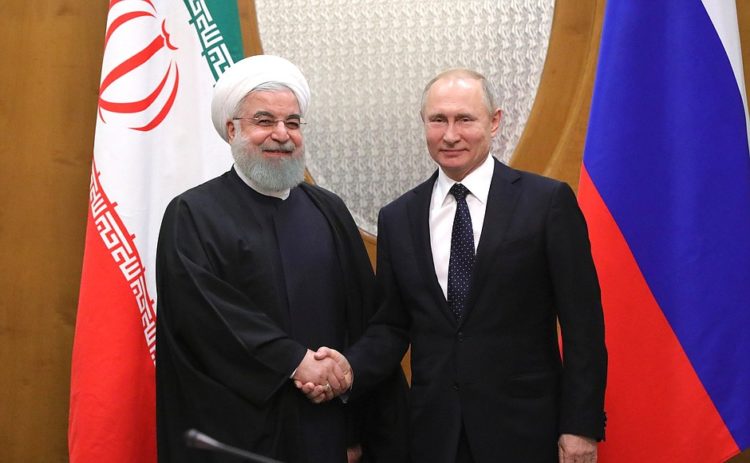On Tuesday, Iranian President Hassan Rouhani responded to news of new American troop deployments to the Middle East with measured words. Despite rising tensions between the United States and Tehran and a history of fiery rhetoric from Iranian officials, Rouhani adopted an almost victim-like posture.
Iran will not wage war against any nation,” Rouhani said in a live TV broadcast. “Those facing us are a group of politicians with little experience. Despite all of the Americans’ efforts in the region and their desire to cut off our ties with all of the world and their desire to keep Iran secluded, they have been unsuccessful.”
The language is reminiscent of another world leader with a nefarious reputation who found himself in the U.S. cross-hairs during the Trump administration: Kim Jong Un. As tensions rose between the United States and North Korea earlier in Trump’s presidential tenure, Kim also shifted his outward approach to paint his nation as the victim of American diplomatic imperialism, using phrases like “gunboat diplomacy” to characterize America’s approach.
In the modern world, shifting public perception can occasionally be just that easy – as news outlets all over the globe picked up Rouhani’s statements, boiled them down into headline-sized tidbits and redistributed at large. Things like nuance and context can’t survive such rapid transmittal, making the world’s media an unwitting accomplice in a nation-level narrative effort. Of course, that’s not actually a trick Iran picked up from North Korea. Rather, both nations learned this approach to narrative manipulation from propaganda’s contemporary heavyweight champ, the Kremlin.
In fact, Iran’s entire approach to this burgeoning conflict has been heavily lifted from Russia’s modern playbook. Despite earning a hard-fought reputation as a military power in the media, Russia lacks the finances to support a prolonged conflict with a technologically advanced nation like the United States, let alone the whole of NATO. Like Iran, Russia can’t engage America in a direct conflict and hope to win, but, like Iran, Russia doesn’t need to. By utilizing a thin veil of plausible deniability, Russia has managed to go about its business exactly as it sees fit. In the past few years alone, Russia has gotten away with supporting the use of chemical weapons against civilians in Syria, violating economic sanctions placed on North Korea, invading Ukraine and annexing territory, attempted assassinations on U.K. soil, and even directly engaging U.S. troops in a firefight. After each incident (and many more), Russian officials have replied to accusations with shrugged shoulders and simple explanations that often defy logic.
Russia has suggested it was the U.S. or its allies using chemical weapons to kill Syrian civilians, denied circumventing sanctions placed on North Korea, claimed its military never stepped foot in Ukraine, accused the British government of foiling its own assassination attempt, and claimed the soldiers killed fighting American Special Forces were all actually unaffiliated Russian mercenaries who traveled to Syria on their own accord. For every violation of international norms, there’s been an excuse and underhanded platitudes, but never an acknowledgement of guilt. Like Iran, Russia assumes the role of the “bigger man” in the press, stating plainly that it has no desire to see tensions continue to escalate.
It is clear to us that we have to defend our interests and to do so consistently, not boorishly or rudely, in both the sphere of the economy and of defense,” Putin said in a TV broadcast last year. “The pressure will end when our partners will be persuaded that the methods they are using are ineffective, counterproductive, and harmful to all.”
By publicly playing the role of the bullied victim while simultaneously acting as the aggressor, Russia and Iran have made it possible to continue to pursue their long-term strategic goals while remaining below the threshold required to spur an armed conflict with the U.S. Working in the strategic area just short of an actual impetus for war is often referred to as “grey zone operations,” where hybrid warfare tactics are utilized to achieve strategic ends without giving America grounds for a full-scale response. America’s military apparatus is well aware of this strategy, but lacks the means to engage with it because, unlike Iran and Russia, the United States plays the role of a global diplomatic leader. America, put simply, has to play by the rules in order to levy the expectation that other nations will also do so.
“In a western military campaign, we tend to shape the environment in Phase Zero, we deter in Phase 1, we seize the initiative in Phase 2, we dominate in Phase 3 combat operations, we stabilize in Phase 4, and we transition to civil authority in Phase 5,” Lt. Gen. Mark Kelly, Air Force deputy chief of staff for operations, explained to a crowd gathered at the Mitchell Institute in Arlington, Virginia, last year.
“The U.S. is really, really good in the deter and win categories,” General Kelly said, “but competition below the threshold of major combat ops is primarily where our strategic peer adversaries are executing their national and military strategies.”
Competition below that threshold of major combat operations has become the only effective way to swim against the tide of American diplomatic and military might. Incidents like the recent oil tanker attacks in the Gulf of Oman last week, like Russian mercenaries in Syria, leave just enough room for each nation’s formal government to deny any involvement, even if the United States is certain that they were responsible. In the public sphere, that denial creates room for doubt, making a declaration of war a more difficult enterprise politically – especially with a presidential election looming in the distance.
Already have an account? Sign In
Two ways to continue to read this article.
Subscribe
$1.99
every 4 weeks
- Unlimited access to all articles
- Support independent journalism
- Ad-free reading experience
Subscribe Now
Recurring Monthly. Cancel Anytime.










COMMENTS